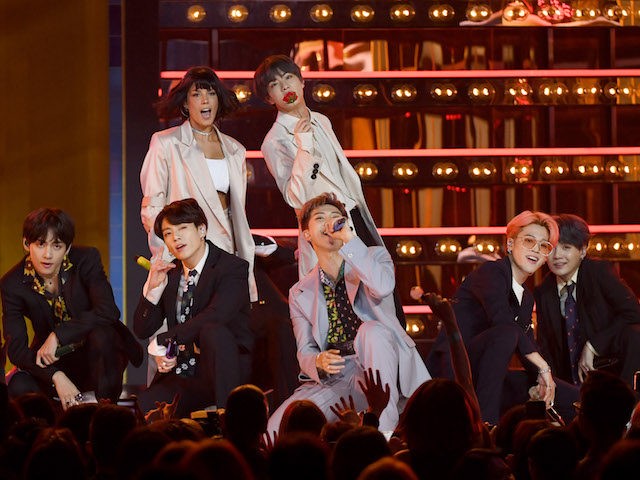The Chinese state propaganda outlet Global Times revealed Friday that Weibo, a Communist Party-controlled social media outlet, had taken action to ban some of the most prominent accounts for fans of the South Korean pop group BTS from the site.
The government-controlled Twitter alternative banned seven BTS accounts and ten pop music fan accounts in total on the same day the South Korean group debuted its latest single, “Butter.” BTS is arguably the world’s most popular musical artist and boasts a formidable fanbase in China; “Butter” attracted 21 million views on Youtube in an hour, breaking a site record held by their previous single, “Dynamite.” At press time, the video boasts 57 million views.
The Chinese Communist Party has belied apprehension about national interest in the group, who have become cultural ambassadors for capitalist South Korea around the world, in the past. Last year, Chinese state media outlets, citing government-approved “netizens” on sites like Weibo, condemned the band after member RM thanked the government of the United States and its military for its “sacrifices” in the Korean War. The pro-American sentiment allegedly offended Chinese Communist Party supporters because it did not also thank China. China fought against South Korea in the Korean War.
“China’s Twitter-like Weibo announced on Friday it has banned 10 accounts of fan clubs from posting for 30 days. The accounts were suspended for encouraging inappropriate behaviors including cyberbullying and improper fundraising and voting,” the Global Times claimed. The state outlet noted seven of the ten were highly trafficked BTS accounts. The most popular account supporting the group boasted 1.2 million followers, giving it outsized power to amplify any content about the band.
The Global Times claimed the bans were popular because music fans were annoying.
“The chaos existing in online fan clubs, such as abusing each other, spreading rumors, cyber manhunt and improper consumption, are among the prominent problems on today’s social media,” a Chinese Communist Party official claimed this month, following the announcement of a larger, sweeping government campaign against online pop fandom called “Clear and Bright.” At the time, the Cyberspace Administration of China (CAC) insisted the Communist Party had a responsibility to curb “irrational behaviors” by pop fans online through censorship. The announcement of the campaign did not mention BTS, however, but the fanbase of a Chinese reality television pop star competition.
The Global Times cited specific complaints from “netizens” about BTS fans, however, one in particular protesting that some engage in online fundraisers for events like their favorite band members’ birthdays. The state newspaper implied these behaviors harmed the country.
The Chinese state media apparatus began demonstrating heightened concern over Korean pop music (K-pop) generally and BTS in particular following RM’s comments last year, which were part of an acceptance speech for the Korea Society’s James A. Van Fleet Award. The members of BTS are the youngest recipients of the award in history, which winners receive for “their outstanding contributions to the promotion of U.S.-Korea relations.”
“The Korea Society’s 2020 Annual Gala is especially meaningful, as this year marks the 70th anniversary of the Korean War,” RM noted in his remarks, which were delivered virtually in October. “We will always remember the history of pain that our two nations shared together and the sacrifices of countless men and women.”
“After 70 years, the world we are living in is much closer than before. Boundaries in many aspects are getting more blurred. As members of the global community, we should build a deeper understanding and solidarity to be happier together,” he concluded. “In pursuit of this cause, BTS will always remind ourselves of the meaning of the Van Fleet award and keep doing our best in all that we do. Thank you very much.”
The Global Times claimed RM’s remarks prompted swift outrage from “netizens” because it failed to mention China, despite the fact that the Korea Society event had nothing to do with China and that the “sacrifices” RM praised the United States for making were made to protect South Koreans from Chinese soldiers. The state newspaper also alleged Chinese e-commerce sites had stopped stocking BTS merchandise in protest.
The Communist Party backlash angered many South Koreans and others who followed the group and did not comprehend the offense. The alleged boycott also fizzled, as some sites clarified their BTS merchandise in China had simply sold out because the band was popular, not taken off the shelves as a political statement.
In February, China redirected its attacks on BTS to investing in a reality competition to create the world’s next great boy band, CHUANG 2021. The program, on the Chinese online medium Tencent, resulted in the creation of a band named “INTO1,” which will make its formal debut after recording original music following the end of the program in April. While the show proved popular, fans generated less enthusiasm for the winners of the competition than for a Russian contestant named Vladislav Ivanov, who regularly insisted he did not want to be on the program and urged viewers to vote him off. Ivanov, performing under the name “Lelush,” delivered poor-quality dancing and singing performances on a weekly basis, bizarrely endearing him to fans. He made it to the final round of the contest and received more global publicity than the newly crowned members of INTO1, now expected to compete against the likes of BTS.

COMMENTS
Please let us know if you're having issues with commenting.